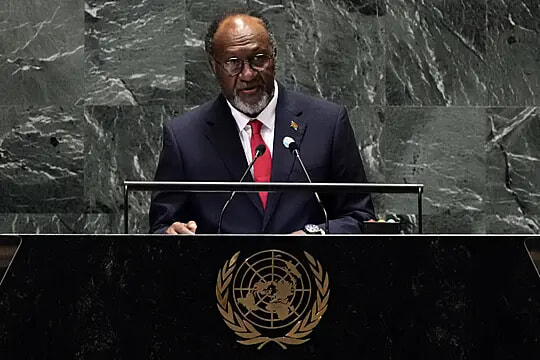
Iran is Telling Its Citizens to Delete WhatsApp From Their Devices
Concerning.
Published June 26, 2025
Advertisement
Advertisement
1. Rising Tensions: Iran’s Directive on WhatsApp

On June 17, 2025, Iranian state television issued a striking warning, urging citizens to delete WhatsApp from their smartphones, claiming the messaging app was being used to gather user information for Israel.No concrete evidence accompanied these allegations, yet the timing coincided with escalating military exchanges between Israel and Iran, heightening public anxiety.WhatsApp, a cornerstone of digital communication in Iran, quickly became a focal point in the nation’s broader concerns about digital security and foreign surveillance.Meta, WhatsApp’s parent company, swiftly rejected the accusations, asserting that all messages sent through WhatsApp are protected by end-to-end encryption, ensuring only the sender and recipient can access their contents.Meta’s public statement underscored their transparency, noting they do not track user locations, maintain message logs, or provide bulk data to any government entity.Despite the app’s assurances, Iran’s call to delete WhatsApp landed amid a “near-total national internet blackout,” with the monitoring group NetBlocks reporting a dramatic reduction in connectivity.This blackout limited the Iranian public’s access to real-time information during a period of intense military conflict and national uncertainty.The directive also referenced other “location-based applications,” signaling a wider suspicion of foreign platforms.Many Iranians, long accustomed to state censorship, have relied on VPNs and proxies to access banned or restricted services.This latest move reinforced the ever-present tension between digital freedom and government control in Iran’s tightly regulated information landscape.
Advertisement
2. WhatsApp’s Response and the Encryption Debate

WhatsApp and Meta responded forcefully to Iran’s allegations, emphasizing their longstanding commitment to privacy and security, especially in times of crisis.In their statement, WhatsApp stressed that their end-to-end encryption technology “locks” chats so that no third party—including WhatsApp itself—can access the contents of personal messages.Meta also maintained that it neither tracks user locations nor maintains logs of who messages whom, countering Iran’s claims with technical details and repeated assurances.For over a decade, Meta has released transparency reports outlining the rare circumstances in which user information might be disclosed, typically under strict legal requirements.Experts in cybersecurity, such as Gregory Falco from Cornell University, note that while message content is encrypted, some metadata—information about who is contacting whom and when—can still be inferred.This metadata, though less revealing than actual message content, has consistently prompted privacy concerns and skepticism about absolute security.Iran’s warning about WhatsApp also highlighted the ongoing global debate over data sovereignty, with some nations demanding that data generated within their borders be processed and stored locally.Falco points out that WhatsApp’s data from Iran is likely not hosted inside the country, making it difficult for Iranian authorities to regulate or scrutinize.This situation reflects broader anxieties about trusting global data infrastructures at a time when digital platforms play outsized roles in political crises.Ultimately, Meta’s response aimed to reassure users in Iran and worldwide that the company takes user privacy seriously, even as governments continue to press for greater control.
Advertisement
3. The Long History of Social Media Bans in Iran

Iran’s move against WhatsApp is the latest in a long pattern of restricting social media access, particularly during periods of domestic unrest or heightened geopolitical tension.Over the years, Iranian authorities have blocked a range of platforms including Facebook, Instagram, Telegram, and Google Play, typically citing national security or public order concerns.Despite repeated bans, millions of Iranians have managed to access these platforms by using proxies and virtual private networks to circumvent government restrictions.In 2022, the government blocked WhatsApp and Google Play in response to widespread protests triggered by the death of Mahsa Amini in police custody, actions widely seen as efforts to curb the free flow of information.That particular ban was lifted in December 2024 as part of a promised reform to enhance internet freedom, but the restoration proved fleeting.During the ongoing Israel-Iran conflict, access to digital communication has again become a strategic battleground, as both information and misinformation can sway public perception.WhatsApp had regained its status as one of Iran’s most popular messaging apps, alongside Instagram and Telegram, before this latest state-backed campaign.Iran’s cycle of censorship, circumvention, and sporadic liberalization reflects a broader struggle over the role of technology in modern societies under authoritarian rule.The population’s ongoing reliance on digital tools to connect, organize, and access news remains at odds with the government’s repeated attempts to limit those very freedoms.Every new restriction underscores the delicate balance between state security imperatives and the everyday digital lives of millions of Iranians.
Advertisement
4. Privacy, Spyware, and High-Tech Surveillance

Concerns about WhatsApp’s privacy are not limited to Iran, as global attention has turned to sophisticated spyware developed by Israeli firms such as Paragon Solutions and NSO Group.Meta has accused such companies of targeting WhatsApp users—activists, journalists, and others—using advanced spyware like Pegasus, which can infiltrate phones remotely and harvest sensitive data.A landmark legal case in May 2025 saw the NSO Group ordered to pay WhatsApp $167 million over a hacking campaign that compromised 1,400 users in 2019.These incidents highlight that, even with end-to-end encryption, messaging apps can be vulnerable to attacks that bypass traditional security mechanisms.Zero-click hacks, in particular, exploit vulnerabilities without requiring users to click on suspicious links, making them especially dangerous and difficult to detect.Meta describes the court victory against NSO Group as a significant step for global privacy, but acknowledges that threats from state-sponsored or commercial spyware persist.In January, it was revealed that a “zero-click hack” had targeted at least 90 WhatsApp users in over two dozen countries, fueling further anxieties.While Meta contends that such attacks are rare and not unique to WhatsApp, the growing prevalence of sophisticated digital surveillance has raised the stakes for ordinary users everywhere.These high-profile hacking campaigns are often linked to broader political objectives, as governments seek to monitor or disrupt dissent, both at home and abroad.The ongoing arms race between privacy advocates and surveillance actors is playing out on a global stage, with real consequences for millions of users.
Advertisement
5. Data Sovereignty and Global Infrastructure Challenges

The latest Iranian crackdown has revived questions about where user data is stored and who ultimately controls it, fueling debates over data sovereignty and the global digital infrastructure.Cybersecurity experts warn that data from messaging apps like WhatsApp, even if encrypted, may still travel through or be stored in data centers located far from users’ home countries.Iranian authorities have argued that such arrangements make it nearly impossible to ensure national control or oversight over sensitive digital information.Calls to “house data in-country and process it in-country with their own algorithms” reflect mounting anxieties about the security and integrity of globally distributed cloud platforms.These issues are not unique to Iran, as governments around the world increasingly demand “data localization” policies to keep sensitive information within national borders.Proponents argue that such measures are essential to prevent foreign surveillance and to enable effective law enforcement, while critics warn of increased costs and fragmented digital ecosystems.The global nature of internet infrastructure—built around transnational data flows and private companies like Meta—complicates efforts to impose local control.Tensions between technology companies and state authorities are likely to escalate as nations seek to assert sovereignty in cyberspace.Meta, for its part, maintains that its operations comply with international law and that robust encryption protects user privacy, even across borders.Yet the question of who ultimately “owns” and controls digital data remains unresolved, shaping policy debates and technology choices from Tehran to Washington.
Advertisement
6. The Role of Information Blackouts in Modern Conflict

Amid the current conflict, Iran has imposed sweeping restrictions on internet access, contributing to a national information blackout just as events on the ground intensify.According to NetBlocks, a 75% reduction in internet connectivity was observed during the recent crisis, severely limiting public access to timely news, digital communication, and social media.This blackout occurred in the context of a dramatic escalation between Iran and Israel, including waves of airstrikes, missile exchanges, and mounting civilian casualties.Limiting digital connectivity has long been a tool for authoritarian governments to control the narrative, suppress dissent, and restrict outside scrutiny during periods of instability.Such measures can disrupt the ability of citizens to coordinate, protest, or simply check on loved ones as crises unfold.In Iran, these blackouts also prevent independent verification of official claims and casualty figures, further muddying the information landscape.Experts warn that strategic disruptions to internet and mobile networks represent a new frontier in modern warfare, where information itself is a critical asset.The public’s reliance on VPNs and other circumvention tools only partially mitigates the impact, as sophisticated censorship methods continue to evolve.The government’s ability to “turn off” the digital world is both a demonstration of power and a source of ongoing vulnerability, as it risks alienating and frustrating the population.Ultimately, information blackouts add another layer of uncertainty and danger in already volatile geopolitical confrontations.
Advertisement
7. Escalating Conflict and the Digital Battleground

The timing of Iran’s WhatsApp directive cannot be separated from the rapidly escalating conflict with Israel, as both nations exchange missiles and cyberattacks.Israel’s recent airstrikes targeted Iranian nuclear facilities and military assets, while Iran has responded with ballistic missiles and threats to close the strategically vital Strait of Hormuz.More than 224 people have been reported killed in Iran since Friday, while dozens have died in Israel, with both sides trading accusations and reprisals.Tehran’s move to restrict digital communication mirrors its broader military strategy—limiting the flow of sensitive information while projecting resilience.The crackdown extends beyond WhatsApp, with Iranian officials warning against the use of any “location-based applications” that could facilitate surveillance or targeting by foreign actors.Media reports suggest that Iran’s leadership views digital platforms as potential vectors for espionage or the identification of key individuals, such as nuclear scientists or military officials.Both Israeli and Iranian military spokespersons have highlighted their respective successes and intentions to continue aggressive operations, including drone strikes and air superiority campaigns.As civilians flee major cities, digital communication becomes both a lifeline and a liability, further complicating an already dire situation.Governments are using every tool at their disposal—including control of the digital commons—to manage, manipulate, and wage modern conflicts.This digital battleground, as much as the physical one, is shaping the course of the war and its human impact.
Advertisement
8. The Global Ripple Effect and International Responses

The Iran-Israel conflict and the crackdown on digital communication have reverberated far beyond the region, prompting international concern and diplomatic fallout.Countries like Pakistan have publicly condemned recent U.S. and Israeli actions, even as global markets and policymakers watch developments with apprehension.The U.S. role remains complicated, with indirect involvement in missile defense and increased deployment of military assets to the region.Statements by officials in Washington, Geneva, and other capitals reflect a delicate balance between condemnation, restraint, and the pursuit of broader strategic interests.The situation in the Strait of Hormuz, a vital artery for global oil shipments, is of particular concern, as any disruption could have cascading economic consequences.Global technology companies, meanwhile, find themselves caught between conflicting demands for user privacy, national security, and compliance with local laws.International organizations and watchdog groups have sounded alarms about the humanitarian and information crises unfolding in the region.Amid this high-stakes environment, technology and diplomacy intersect in unpredictable ways, with digital platforms like WhatsApp becoming symbols of both freedom and vulnerability.These events underscore the interconnected nature of modern crises, where what happens in one country’s digital sphere can affect millions far beyond its borders.As governments and companies navigate this terrain, the world watches closely for the next move in a rapidly shifting landscape.
Advertisement
9. Civilian Life, Information, and Human Rights

Behind the headlines and diplomatic maneuvering, ordinary people are left to navigate the uncertain terrain of conflict, censorship, and digital vulnerability.The restriction of apps like WhatsApp disrupts daily routines, severs lines of communication, and heightens the sense of isolation for families both within Iran and abroad.For many, social media and messaging apps serve as lifelines during emergencies—connecting loved ones, sharing news, and organizing relief efforts.Information blackouts and platform bans can have life-and-death consequences, especially as misinformation proliferates in the absence of reliable channels.Human rights groups have consistently warned that suppressing digital communication undermines fundamental freedoms and hinders humanitarian work.Reports of robotic voices answering international calls and the widespread use of proxies and VPNs illustrate the resilience and ingenuity of the Iranian public.Yet, these workarounds are not foolproof, and the risks associated with circumventing censorship remain real and significant.The tension between national security and civil liberties is not unique to Iran, but the stakes are especially high in times of open conflict.Every new restriction raises urgent questions about the future of digital rights and the ability of people to communicate freely in a connected world.In the end, the story of WhatsApp in Iran is about much more than one app—it is about the fundamental struggle for information and autonomy in the 21st century.
Advertisement
10. The Road Ahead: Uncertainty, Innovation, and the Fight for Digital Freedom

As the Israel-Iran conflict continues to unfold, the intersection of warfare, technology, and human rights grows ever more complex.Iran’s directive to delete WhatsApp and the associated information blackout mark a new phase in the country’s ongoing battle to control its digital borders.For technology companies like Meta, the challenge lies in protecting user privacy while complying with—or resisting—pressures from powerful state actors.Meanwhile, ordinary Iranians must contend with rapidly shifting rules, rising risks, and the need for ever more creative strategies to stay informed and connected.Internationally, policymakers and activists face mounting questions about the governance of digital spaces in times of crisis.Cybersecurity experts warn that the arms race between surveillance and privacy technology will only intensify, as both states and commercial actors seek new ways to access or protect data.The fate of messaging apps in Iran, and similar battles elsewhere, may set precedents for digital freedom—or repression—around the world.As digital and physical conflicts converge, the future of information, privacy, and civil liberties will hinge on the choices made in moments of crisis like these.For now, the struggle continues—on smartphones, in policy debates, and in the daily lives of millions navigating a world where the stakes of digital freedom have never been higher.Ultimately, the story of WhatsApp in Iran is a microcosm of the global contest between control and connection, playing out in real time against the backdrop of war and upheaval.
Advertisement
Advertisement
You May Also Like






